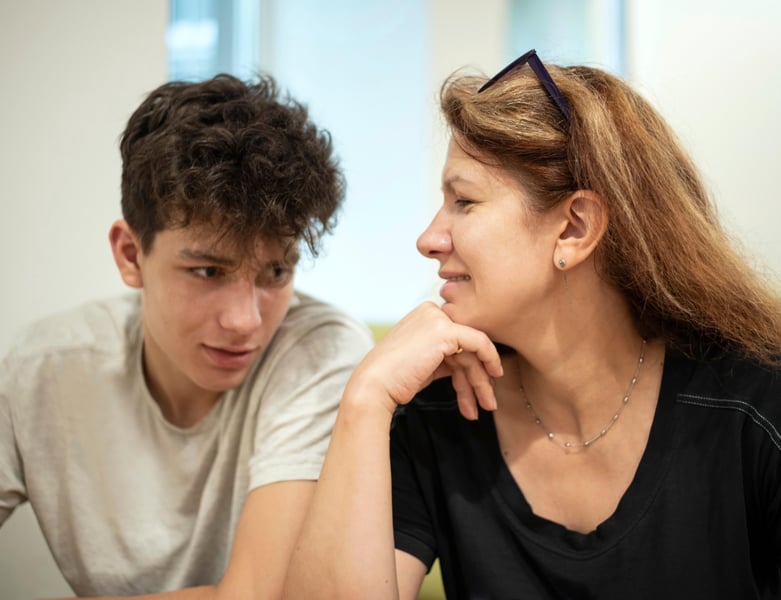Get Healthy!

- Posted October 11, 2022
Teens Can Be Tough on Parents. Staying Close Can Make All the Difference.
Parents who make an effort to spend quality time with their teens -- while offering affection and understanding -- are more likely to remain close to them as they enter adulthood, new research suggests.
“The data tell a clear story: You reap what you sow,” said lead author Gregory Fosco, a professor of human development and family studies at Pennsylvania State University.
Parents who stay involved and continue to share in activities with their teens find they are better at keeping touch as adults, he said.
“Parents who continue to praise and support their teen have a closer, more connected relationship with their adult child,” Fosco added. “And, parents who are consistent, clear and kind in their discipline with teens lay the foundation for less friction with their adult child.”
The finding stems from a multi-year survey that tracked the views of roughly 1,600 kids in rural or semi-rural Iowa and Pennsylvania. Nine in 10 were white, and a little over half were girls. They were first surveyed in sixth grade, and then every year until they graduated high school. Researchers then rounded back to do one more survey at age 22.
While in high school, teens were asked to indicate how much time they spent with their parents in various types of activities, like school work, sports and/or leisure time. They were also asked to assess how warm and openly affectionate their parents were towards them, as well as how harsh or measured their parents were when it came to disciplining them.
As young adults, participants were asked how often they were still in touch with their parents, whether in person or otherwise. They also reported how close they felt towards their parents, and how likely they were to openly share any positive feelings or anger about their parenting toward them.
The result: The more time parents spent with their teenage kids, the more likely they were to have contact with them in their early 20s.
Similarly, warmer parent-teen interactions were more likely to foster warm parent-young adult connections.
The findings appeared to hold up regardless of gender, race, family income or young adult living arrangements.
Still, Fosco acknowledged that “parenting teenagers can be confusing,” and maintaining a close relationship during the upheavals of adolescence is easier said than done.
In fact, it's important that parents understand that confusion typically goes both ways, said Robin Kowalski, a professor of psychology at Clemson University in Clemson, S.C., who was not involved in the study.
She pointed out that “at a time when young people are trying to establish some independence and find out who they really are, chaos sets in as their relationships with both peers and parents become strained, and they feel uncomfortable in their own bodies due to the changes brought by puberty."
The upshot, she said, is this: "The emotional turmoil that adolescents experience — combined with their desire for independence -- leads them to often distance themselves from their parents.”
Fosco agreed.
“The teenage years are a time of considerable change,” he said. “Teens seek more autonomy and time away from their family. Parents often recognize they have to adjust their parenting style as their teens grow older, but they may also feel unsure how to do so. Should they praise and encourage their child or leave them be? Should parents work to spend time with their teen, or let them hang out with friends? Should parents uphold rules and limits on teen behavior, or should they treat them like adults?”
The findings suggest that while parenting should change over time, parents shouldn't back off too quickly, Fosco said.
Kowalski echoed that advice, suggesting that parents let their teen know they are available and willing to help whenever needed.
To that end, Fosco advised moms and dads to look for "sweet spot" moments, where being affectionate with a teen is both possible and primed to be most effective.
Here are some examples: “If your teen gets embarrassed by praises in front of others, find moments when they are alone to offer sincere complements or tell them you love them,” Fosco suggested. “If your teen prefers spending time with friends, use the car rides to drop them off or pick them up as a way to have one-on-one time with your teen while supporting their social relationships. Car rides are a great time to catch up in brief conversations. You might cook your teen's favorite meal so you can sit down together. Sometimes the small moments are when parents can really ‘show up' if they find opportunities in everyday activities.”
On the disciplinary front, added Fosco, try explaining exactly why a curfew is warranted or staying in touch is important.
“It can be surprising how often sharing one's reasons for parenting decisions can help teens understand the decisions, even when they don't like them,” he said.
The research was recently published in the journal Developmental Psychology.
More information
There's more about parenting teens at the American Psychological Association.
SOURCE: Gregory Fosco, PhD, professor, human development and family studies, and associate director, Edna Bennett Pierce Prevention Research Center, Pennsylvania State University, University Park, Pa.; Robin Kowalski, PhD, professor, psychology, College of Behavioral, Social and Health Sciences, Clemson University, Clemson, S.C.; Developmental Psychology, Sept. 1, 2022
